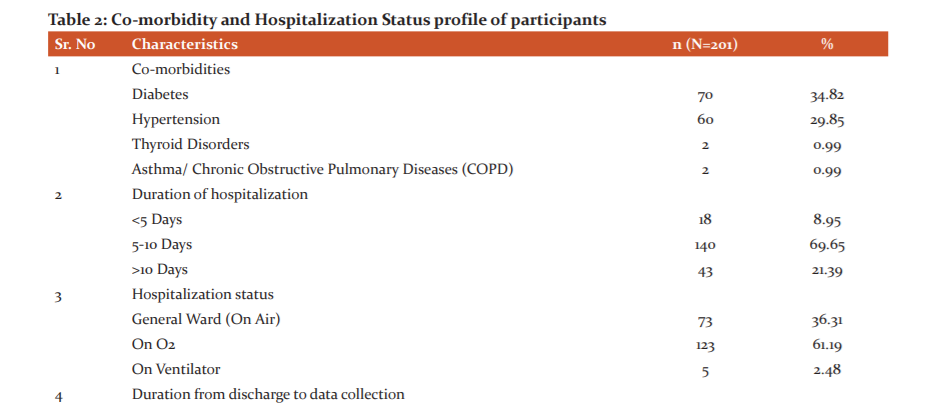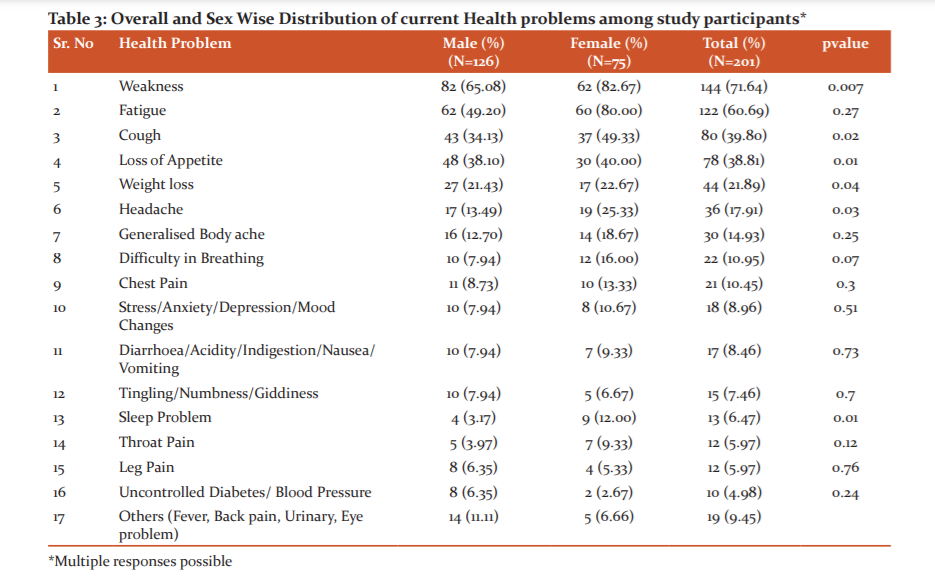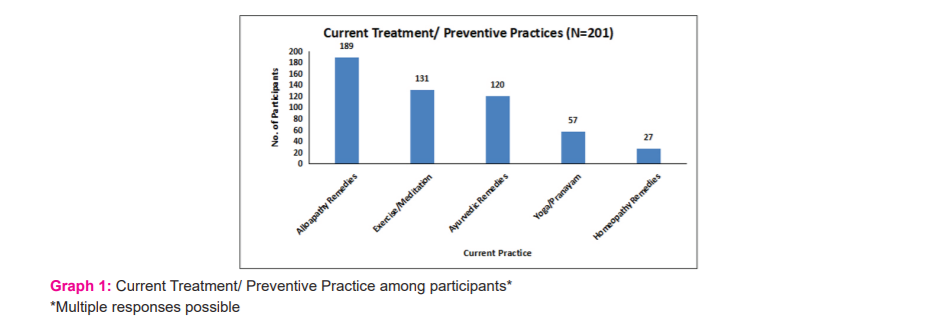IJCRR - 2nd Wave of COVID-19: Role of Social Awareness, Health and Technology Sector, June, 2021
Pages: 227-231
Date of Publication: 11-Jun-2021
Print Article
Download XML Download PDF
Evaluation of Health Problems of Post COVID-19 Discharged Patients from Dedicated COVID Health Centre (DCHC), (Nootan General Hospital, Visnagar)
Author: Pandya Vijay, Dave Bhargav, Patel Nikhil, Prajapati Manisha
Category: Healthcare
Abstract:Introduction: Coronavirus disease 2019 (COVID-19) is a perilous condition with more than 136 million cases and 2.9 million deaths worldwide. It is now quite clear that the impact of COVID-19 lies way beyond the treatment phase so, it is very crucial to understand post COVID-19 outcome in recovered patients to understand if they can develop any other complications. Objectives: To evaluate the health problems in post COVID-19 discharged patients Methods: A Cross-sectional study conducted on post-recovery discharged patients between 20th July to 15th November (201 patients) from Nootan General Hospital, Visnagar. Result: 201 Participants (126 Male and 75 Female) were included in the study with highest numbers from 14-60 years (61.69%) age group. Total 70 (34.82%) participants had Diabetes and out of 201 participants, 123 (61.19%) required O2. More than two-third (69.65%) of participants required hospitalization between 5-10 days. Most common complaint at the time of interview was Weakness (71.64%) followed by Fatigue (60.69%), Cough (39.80%), Loss of Appetite (38.81%). Statistically, significant difference was observed between Male and Females (p< 0.05) for the above mentioned symptoms. Compliance of allopathic follow-up medicine was good. Conclusion: As symptoms after recovery tend to continue for longer time period proper precautions (Diet, Medicines, Exercise etc.)should be followed by all recovered patients and regular follow-up on notice of any persistent symptom is advised even after full recovery to avoid grievous complication.
Keywords: Complication, COVID-19, Health status, Pandemic, Post recovery, Symptoms
Full Text:
Introduction:
Severe acute respiratory syndrome coronavirus-2 (SARS-CoV-2) is causing a disease named as Coronavirus disease 2019 (COVID-19).On 30th January 2020, World Health Organization (WHO) has declared this outbreak a global health emergency. Case fatality rate of COVID-19 is about 2-3% and proportion of mild cases is around 85%. 1As on 14/04/2021 about 136 million cases have occurred around the world. In India, until now around 14 million people have suffered from COVID-19 and out of them 12 million people have successfully recovered. India has the second-highest no. of COVID-19 case burden after US in world. In Gujarat, until now 3,67,616 cases have occurred and out of them, 3,23,371 patients have recovered with 88% recovery rate. In Mehsana district 8843 cases had been recorded till now and from them, 7809 patients have recovered so, recovery rate is 89%.1,2,3It is quite clear now that the impact of COVID-19 lies way beyond the treatment phase, even for the majority who are affected by milder form of the disease. It is now known that COVID-19 is not only affecting lungs but it’s a multiorgan disease, it seems now necessary to take follow-up of these recovered patients and perform thorough assessment for detection of any further complications which will guide us for proper management.4
Aim:
Evaluation of health problems in post COVID-19 discharged patients
Objectives:
-
To know socio-demographic and hospitalization profile of discharged patient
-
To know the present condition of patient in terms of medical health problems and complications
-
To know about current treatment and preventive practices of participants
Methodology:
A Cross-sectional study was conducted with study duration between 10th November to 10th December 2020
Sample size: All COVID-19 positive discharged patients from 20th July 2020 to 15th November 2020 from Nootan general hospital, Visnagar were included in the study
Data collection: A performed semi-structured questionnaire was used for data collection. Details about COVID-19 positive discharged patients were taken from Nootan General Hospital, Visnagar and data collection was done by 2 methods
-
Telephonic interview: After taking informed verbal consent questions were asked to study participants telephonically
-
Personal interview: 20% of finalized sample size patients were included in the study through personal interview. Informed and written consent was taken from them.
(personal interview was done either in hospital premises at the time of follow-up visit of patient/ Home visit of patient was done and interview was conducted)
Inclusion criteria:
-
All COVID 19 positive discharged patients from Nootan General hospital, Visnagar
-
Patients who gave consent to participate in the study
Analysis: Data was entered in Microsoft excel 2016 and analysis was done by Epi-info software version 7.2. Qualitative variables were entered in terms of frequency and percentage. Quantitative variables were entered in terms of mean and standard deviation
Statistical analysis was performed by using appropriate parametric and non-parametric tests. p<0.05 was to be considered as statistically significant value at 95% confidence interval
Ethical clearance was taken from Institutional ethical committee wide letter no. IEC/NMCRC/APPROVAL/57/2020
Results:
Total 201 participants were interviewed who were discharged from Nootan General Hospital,Visnagar after recovery from COVID-19. Out of which 41 participants were interviewed by in person interview and remaining 160 participants were telephonically interviewed. Table 1 represents the socio-demographic characteristics of participants which shows 126 (62.68%) were Male and 75 (37.31%) were female participants and majority of participants (71.64%) who were admitted for COVID-19 disease were from 14-60 years age group (61.69%). More than one-third of participants (38.30%) had studied up to graduation. Around one-third (32.83%) participants were Housewives followed by Businessmen (25.87%) by occupation. Table 2 shows Co-morbidities and Hospitalization profile of participants. Diabetes was the commonest observed co-morbity with 70 (34.82%) participants having it, followed by 60 (29.85%) participants were having Hypertension. Most of the participants (69.65%) were admitted in Hospital for 5-10 days and majority of participants (61.19%) required O2 therapy while admitted to hospital and only 5 patients required ventilator support care.21 participants have preferred to get tested for COVID-19 again at the time of discharge from Hospital. According to participants, median days required for them to return to their daily routine day-to-day life were21 days. Table no. 3 shows current (At the time of interview) health complaints of recovered participants. Among them, most common complaint was Weakness which was recorded in 144 (71.64%) participants followed by Fatigue in 122 (60.69%) participants. 82 (65.08%) Male participants and 62 (82.67%) Female participants were suffering from weakness and that difference is statistically significant (p value = 0.007). Cough was the third most common complaint with 43 (34.13%) Male and 37 Female (49.43%) and overall 80 (39.80%) participants reporting it with statistically significant difference between male and female (p=0.02). Other statistically significant different parameters between male and female participant were Loss of appetite, Weight Loss, Headache and Sleep problem (p<0.05). Graph no. 1 describes current treatment/ preventive practices among participants with 189 (94.02%)participants are taking Allopathy remedies (Blood thinners and Vitamin supplements) followed by Exercise and Meditation by 131 (65.17%) participants and Ayurvedic remedies by 120 (59.70%) participants.
Discussion:
As the pandemic has continued, it is now known fact that some patients are facing extended multiple organ symptoms even after recovery from initial infection. Several clinical symptoms were reported by recovered patients and outcome of such manifestations are a major health concern. Present study was conducted to know the health problems as well as preventive and treatment practices of participants who were discharged after full recovery from COVID-19.
In present study Male and Female population was 62.68% and 37.32% respectively. Study done by Angelo Carfì et al., in Italy5 showed same kind of sex distribution with 37.1% of Female participants and the study done by Shiua Luo et al.,6 done in China had 45% of Females in the study participants. That shows slight male dominance in admission at hospital. Mean age of participant in present study was 55.41+ 13.94 in comparison to 46.5 years in Shiua Luo et al., of China and 56.5 in Angelo Carfi et al., of Italy study. In present study, not a single child was admitted to hospital. That shows that generally higher age group population needs hospitalization. In present study, 61.19% of patient required O2 support but only 2.48% of patients required ventilator care. similar kind of findings was observed in Carfi et al., study in which 53.8% of participants required O2 therapy and only 4.9% of participants required ventilatory care during hospitalization. As Nootan General Hospital is Dedicated COVID Health Centre Hospital, moderate to severe cases are admitted in this hospital so O2 therapy patients are more but as finding suggests ventilatory care was required in very less no. of patients that shows similar trend with epidemiology that only 1-2% patients required ventilator support.
Present study has reported most common symptom after recovery from COVID 19 was Weakness (71.64%) followed by Fatigue (60.69%) while in study done by Carfi et al., in Italy showed Fatigue as the most common symptom in 53.1% of patients and reported that 87.1% participants were suffering from any 1 symptom even after discharge. Study done by Puntmann VO et al.,7 noted fatigue in 38% of patients after discharge. Another study done by Limei Liang et al., in China8showed Palpitations and Breathlessness on exertion (62%) followed by Fatigue (59%) as most common symptoms. Other common symptoms reported in present study, as well as other studies were Fever, Cough, Dyspnoea, Diarrhoea, Joint Pain, Headache, Loss of Appetite, Ringing in the ears, Stress and Anxiety etc.5,6,7,8, 9,10
Most of the patients are taking their post-recovery allopathic treatment in the form of Blood thinner and Vitamins supplements that shows compliance to treatment after recovery is very good among participants. Same way Exercise and meditation and other Ayurvedic remedies adherence are also found satisfactory. These are very good signs that shows participants adapt different modalities of treatment and preventive measures and good adherence to it.
As our all participants comprise hospitalized patients as well as most of the infections were of moderate or severe nature and around two-third of them were having co-morbidities these findings might differ from patients with milder symptoms who are more likely to be found in the community and not needing hospitalization.
Conclusion:
Post COVID-19 recovery medical manifestations needs multifaceted approach to tackle it and one of the approach is to establish post COVID Care Centre' which can provide Medical, Psychological and Vocational facilities. It is also important to do regular follow-up of recovered patients from COVID-19 for early detection of complications and continue to take proper precautions in the form of Medicines, Diet and exercise. This can prevent chronic disability among all recovered patients and further reduce the burden on healthcare resources and economy
Acknowledgement: We would like to acknowledge our Dean, Nootan medical college and Superintendent, Nootan general hospital for guiding and permitting us to do this research. We would like to acknowledge all the participants for sparing their valuable time by answering our questions for study.
Source of Funding: Nil
Conflict of Interest: None
Authors’ Contribution:
Pandya Vijay: Concept, Proposal Preparation, Analysis
Dave Bhargav: Concept, Proposal Preparation, Analysis, Paper writing
Patel Nikhil: Concept, Proposal Preparation, Analysis, Paper writing
Prajapati Manisha: Data Collection, Data entry





References:
1. WHO Coronavirus (COVID-19) Dashboard [Internet]. Covid19.who.int. 2021 [cited 15 April 2021]. Available from: https://covid19.who.int/
2. Coronavirus in India: Latest Map and Case Count [Internet]. Covid19india.org. 2020 [cited 15 April 2021]. Available from: https://www.covid19india.org/
3. Coronavirus in India: Gujarat [Internet]. 2020 [cited 15 April 2021]. Available from: https://www.covid19india.org/state/GJ
4. Balachandar V, Mahalaxmi I, Subramaniam M, Kaavya J, Senthil Kumar N, Laldinmawii G, et al. Follow-up studies in COVID-19 recovered patients - is it mandatory? Sci Total Environ 2020 Aug;729:139021.
5. Carfì A, Bernabei R, Landi F. Persistent Symptoms in Patients After Acute COVID-19. JAMA 2020 Aug 11;324(6):603.
6. Luo S, Guo Y, Zhang X, Xu H. A follow-up study of recovered patients with COVID-19 in Wuhan, China. Int J Infect Dis 2020 Oct;99(January):408–9.
7. Puntmann VO, Carerj ML, Wieters I, Fahim M, Arendt C, Hoffmann J, et al. Outcomes of Cardiovascular Magnetic Resonance Imaging in Patients Recently Recovered From Coronavirus Disease 2019 (COVID-19). JAMA Cardiol 2020 Nov 1;5(11):1265.
8. Liang L, Yang B, Jiang N, Fu W, He X, Zhou Y, et al. Three-month Follow-up Study of Survivors of Coronavirus Disease 2019 after Discharge. J Korean Med Sci. 2020;35(46):1–15.
9. Halpin S, O’Connor R, Sivan M. Long COVID and chronic COVID syndromes. J Med Virol. 2021;93(3):1242–3
10. COVID-19 (coronavirus): Long-term effects [Internet]. Mayo Clinic. 2021 [cited 15 April 2021]. Available from: https://www.mayoclinic.org/diseases-conditions/coronavirus/in-depth/coronavirus-long-term-effects/art-20490351
|






 This work is licensed under a Creative Commons Attribution-NonCommercial 4.0 International License
This work is licensed under a Creative Commons Attribution-NonCommercial 4.0 International License